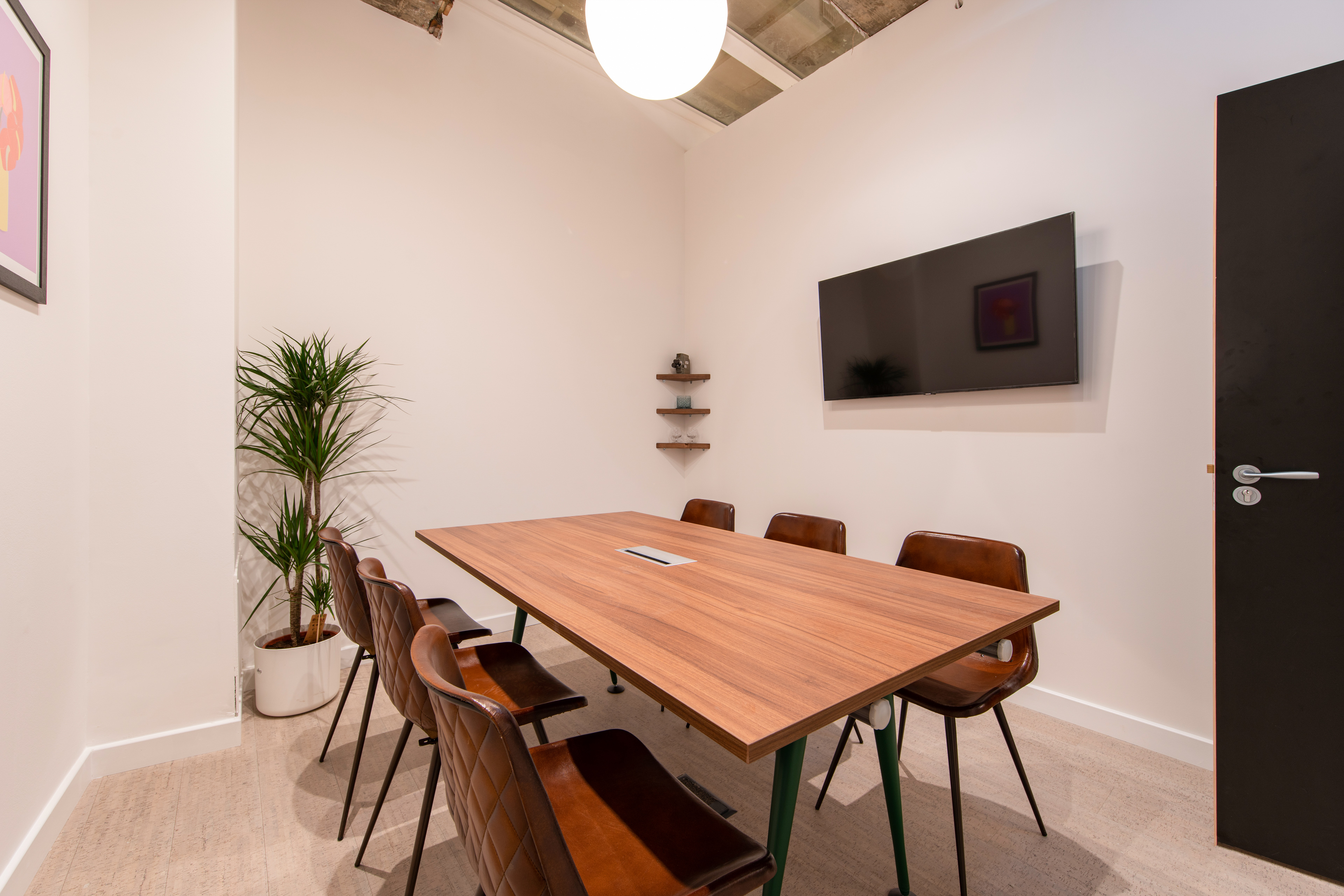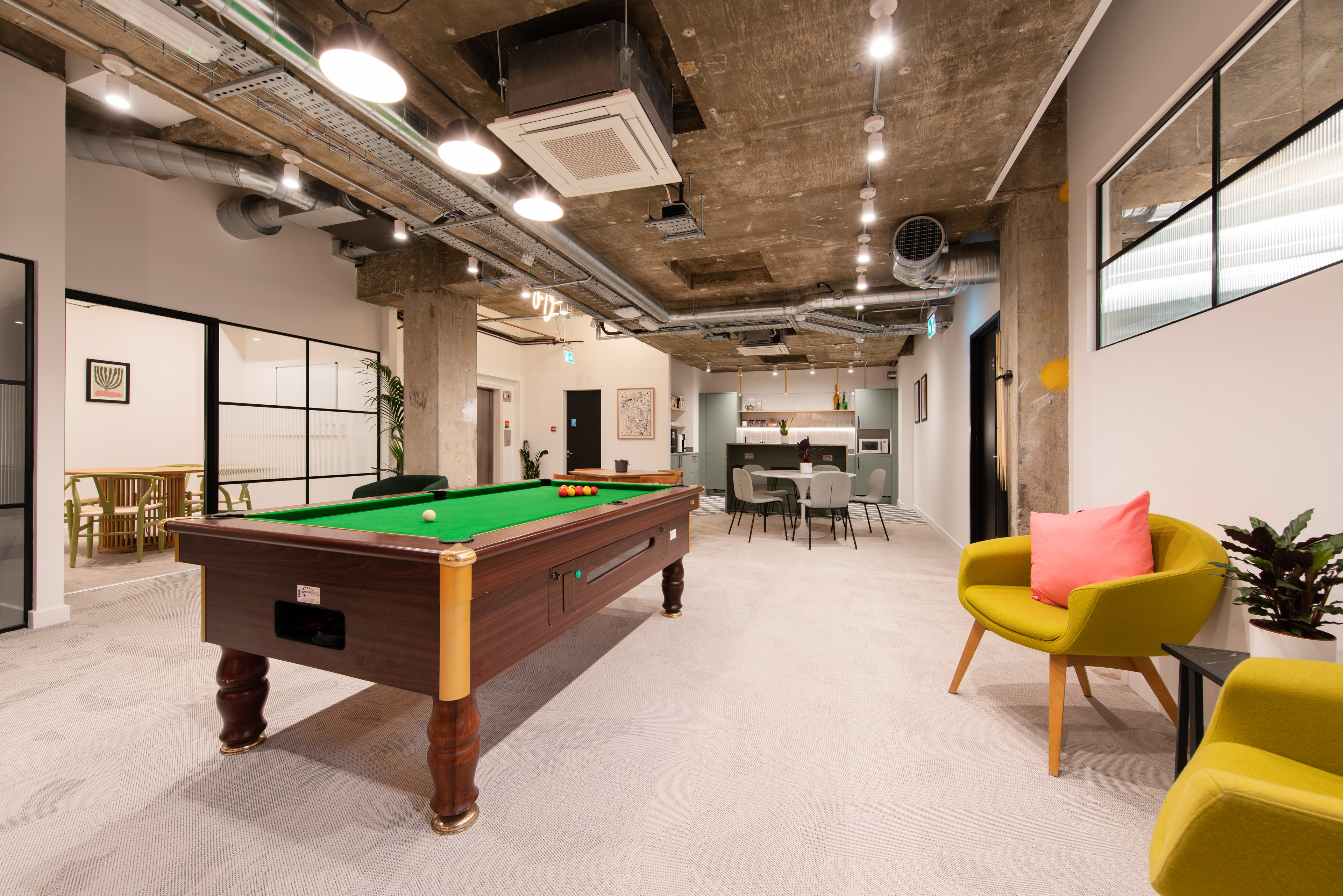Did coming in at that early stage give you more options to personalise the space?
“One hundred per cent. I felt heard. And I felt that all our needs were massively addressed. I feel that we had, and still have a partner. It’s definitely the opposite of what we had in the past. It’s exactly what we were looking for. Somebody that can understand how we operate. Someone that can adjust and give us recommendations and support this thing that we’re building.
We’re building something over here that’s strategically big for the company, and we were looking for somebody that could give us the edge in their way of thinking, saying ‘hey, maybe we should do that’ or ‘maybe we should do this.’ And this is exactly what we found with Canvas and we’re very happy with that.”

We’ve just seen some of the team using some of the communal space, and you mentioned having a balance of private and communal space earlier. How important is that for you and the team?
“So, this office has 29 people. We have technical hubs in Tel Aviv, in the US and Berlin as well, but this is a business hub, and that’s important because primarily you do business when you’re speaking to clients and meeting clients and have conversations with them constantly. For me, it was very important for us to find a place that had great meeting rooms and booths, like dedicated ‘escape rooms’ where people can go and have those one-on-one meetings, but also have the bigger meeting spaces. It was crucial for us and we found it here. The variety of the offices that Canvas currently offer in Farringdon is immense for us.
We worked with the [Canvas] team to build spaces which help the sales teams and account managers do their jobs of having conversations without the need to worry about booking this room or that room, places that are only available at certain times. It can be really tedious and time consuming, and creates this fear of ‘hey, I don’t want to go in to the office because it can be really hard to even have a call and I can’t actually do my job’! And this is what we managed to prevent. It’s one of the reasons we have a big attendance here, because of the facilities you’ve managed to build.
“We try to create this balance of ‘come to the office, have conversations with your peers, understand what’s happening, be aware of the things and the dynamic and what’s developing in the company and with the products’. But also you have Mondays and Fridays where you can be at home and sit and focus on your project without any distractions. This balance is critical for us.”
Canvas is all about spaces and connections and though we like introducing you to your neighbours, you can dip in and out of that as much as you want. Do you find the little social touches you may not find elsewhere important?
“Yes definitely. I can tell you that the two people from our team who were involved in the meeting room naming events were really happy to share their experience with the company. Those small things that connect our company to another company. Being part of something, being heard, having someone you can go and ask for something, and you know that there’s somebody over there that will support you. It makes a difference. The teams are very happy they have someone that will listen to our needs. It addresses something that we might not necessarily get in other places.”
And do you value having that relationship with Tsubi and Cara who come in to the office, being there and having those conversations in person?
“I mean, we’re on WhatsApp so that’s everything! We have that openness and acceptance, and they respond to requests so quickly and everything is addressed in a professional manner. I’ll tell you in all honesty, in the previous space we had, we had a very default setting. We had a table and maybe a lamp, whereas over here we had a chance to reinvent ourselves.
Like, how do we set up the rooms? How many tables in each and every one of them? Where do you want the phone booths? What decorating style do we want? What pictures? Maybe we should knock through rooms and have more collaboration between the two teams etc, and this is what we achieved. A partner who listened. Addressed them. Tried to understand why we need them and recommend according to our needs. And it starts with that and goes all the way to the acoustics in the meeting room – do we have the right sound or do we need something else?
The small things that create massive value for us. We have a very strong sense of collaboration. Those needs are constantly ongoing. We need keys. We need something else. The teams are constantly addressing our needs and supporting us. So thank you.”
We love watching your team interact because it’s so clear that people genuinely like each other. They all want to have lunch together, play pool together and you can see the DT team all get along.
“Yes! And this office is extremely important for us. It’s the first office in the company of almost 1,000 people that we’ve managed to bring the four entities of the company that have been acquired into one place. In most of the other places it’s been a bit more scattered and we’re still trying to bring people to the offices.”

And what are the reactions from other business hubs when they see this place?
“For London I have this new saying that ‘all roads lead to London’ as opposed to ‘Rome’. It’s all coming here. So we see people coming from AsiaPac, from the Middle East and from Europe, coming to London to visit us. The feedback that we get from senior levels of the company is that we’ve managed to create something very unique because people are super keen to come into the office as they get to see their colleagues but also because they have a good time. And that’s rule number one, if you like what you do and you’re happy where you’re doing it then you’ll continue to do it and achieve what you’re trying to accomplish.
So what we’ve managed to do here, we’re trying to replicate it with other offices around the world, but it’s hard with some of the facilities. It’s so difficult to replicate the London environment and it’s hard to replicate Tsubi!”
So, what’s next for Digital Turbine?
“We’re starting lots of strategic products, and we’re launching alternative stores. Basically, up until now, there are two main stores that you download applications from, there’s GooglePlay and the App Store for Apple. This duopoly has been running for the last 15 years and there’s been lots of discussion about how beneficial that is for clients. An alternative store is better for users and it creates a better business model for the app developers because they’ll pay lower fees so they can focus on actually growing their businesses.”
Exciting times!
“Yeh! So maybe when you download an app it’ll be from our alternative app store!”
At Canvas, we take time to understand your business, and the people that make it great. We translate that understanding into a space that sets you up for success. Come and talk to us today about our spaces. We can’t wait to collaborate.




